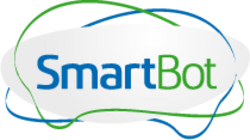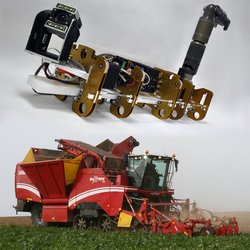SmartBot
application-oriented solutions for agriculture, shipbuilding and small-scale industrial production

SmartBot develops application-oriented solutions for agriculture, shipbuilding and small-scale industrial production. DFKI is involved in the sub-projects AgroBot (agriculture) and RoboShip (shipbuilding). The objective of the sub-project “AgroBot” is to automate agricultural processes. An example is the harvesting of sugar beet. In RoboShip, an autonomous robot for the inspection and maintenance of ballast water tanks in ships will be developed.
| Duration: | 01.04.2011 till 31.12.2014 |
| Donee: | German Research Center for Artificial Intelligence GmbH |
| Sponsor: | INTERREG Deutschland Nederland |
| Partner: | INCAS3, Meyer Werft, Universität Twente, Universität Groningen, Xsens, Imotec, Hochschule Osnabrück, Amazone Werke, DLV Plant, Grimme, Universität Wageningen, Tyker Technology, B. Strautmann und Söhne, Productschap Akkerbouw |
| Application Field: |
Logistics, Production and Consumer
Agricultural Robotics |
| Related Projects: |
ROT
Robots in Tanks
(05.2009-
04.2011)
marion
Mobile autonomous, cooperative robots in complex value chains
(08.2010-
11.2013)
|
Project details
SmartBot is a cross-border collaboration involving 24 different partners from Germany and the Netherlands. The aim is to develop multi sensor robot platforms for maritime, agricultural and industry applications. The SmartBot project strengthens the collaboration among different parties in both economic and technological ways. The project also helps to create a global knowledge hotspot on sensor robotics (SmartBots) in the border-region between Germany and the Netherlands.
AgroBot: In the developed countries, the amount of people available to do the agricultural work is decreasing, but there is an increasing demand for food in our growing population. Agriculture is looking for economy of scales, but is meeting boundaries as far as soil erosion is concerned and as far as what is legally possible transport on the roads. In the AgroBot project we are developing 5 demonstrators in an agricultural environment: a scarecrow, a fodder robot, a potato weed remover, a weedy and a beet harvest robot. Developing these demonstrators requires a close cooperation between biology, science and industry.
RoboShip: The shipping industry is extremely competitive. European shipyards can only stay ahead of the international competition by specialization in building ships with a high added value. An example is the cruise ships built by the Meyer wharf in Papenburg. However, staying competitive, the shipyards will have to lower their production costs even further. This can be achieved by standardizing components, processes and design, and by an increasing automation of the production process.
Despite all the recent innovation in the shipbuilding industry there are still many manual processes. An example is processes in ballast water tanks, such as welding, welding inspection, cleaning, coating and inspection. BWTs are used to stabilize a ship. They are constructed in a way (i.e. narrow, complex) that makes access for both people and robots very difficult.
The purpose of RoboShip is to develop an intelligent multi-sensor robot system for the inspection and maintenance of ballast water tanks in ships such as the cruise ships built at the Meyer wharf in Papenburg.

